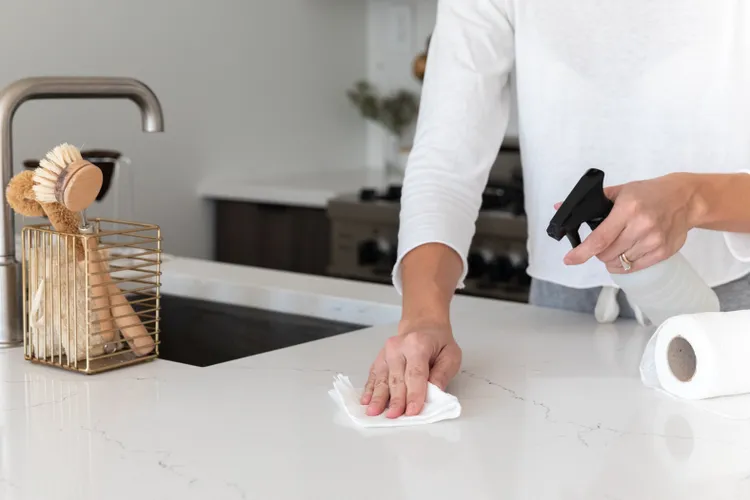When cleaning your kitchen, your bathroom, and even your bird feeder, vinegar can be an excellent, eco-friendly alternative to commercial products and harsh chemicals. The acetic acid makes it suitable for tough build-up from hard water, grease, and many other stubborn stains. But according to cleaning experts, vinegar has its limitations.
We spoke with three professionals in the cleaning industry to discover whether vinegar disinfects as well as it cleans, and they all agreed that vinegar can’t defeat certain germs and bacteria.
Does Vinegar Disinfect?
Vinegar is a popular and powerful natural cleaner. It can be used to clean a variety of surfaces and items throughout the home, from your coffee maker to your windows and more. But if disinfecting is your goal, professionals say vinegar isn’t the best tool for the job.
“While vinegar does contain antimicrobial properties, it doesn’t meet the EPA’s standards as a registered disinfectant,” says Tim Conn, the president and co-founder at Image One.
Conn goes on to explain that vinegar doesn’t kill all of the bacteria and viruses, such as those that cause the cold and flu, that true disinfectants are designed to eliminate.
Carylanne Brown, a Senior Grove Guide at Grove Collaborative echoes Conn’s statement.
“Despite its strengths, vinegar…does not meet the rigorous standards required to guarantee the elimination of nearly all harmful pathogens.”
Conn and Brown agree that vinegar can be an effective all-purpose cleaner, suitable for tackling grease, removing mineral deposits, and eliminating odors. However, both are quick to add that vinegar alone is not the proper solution for disinfecting.
What Should You Use to Disinfect?
If you’re cleaning an area that may harbor bacteria or viruses, such as high-touch zones or commercial spaces, it’s important to use EPA-registered disinfectants that are proven to effectively eliminate germs.
“I would recommend using products with hydrogen peroxide or alcohol-based formulas that are labeled as EPA-registered disinfectants,” says Jared Sarbit, the CEO at Picture Perfect Cleaning.
To determine whether a product is EPA-registered, search for the EPA registration number on the bottle. You’ll also find clear instructions for use as a disinfectant, as well as contact time, precautionary statements, and more.
If you’d prefer to make your own disinfectant, there are viable options as well, including a disinfectant spray with a diluted chlorine bleach solution or disinfectant wipes with a hydrogen peroxide base. These are especially ideal if someone in your home is sick and you want to minimize the transfer of germs.
How to Use Vinegar to Clean Your Home
Despite its drawbacks, our experts agree that vinegar can be an excellent all-purpose cleaner, especially when it comes to stubborn build-up from grease, hard water, and even soap scum.
“Vinegar is undeniably a highly effective and versatile cleaning agent,” says Brown, who uses vinegar to clean everything from floors to windows.
Tip
Keep in mind that cleaning vinegar and white vinegar are similar cleaning solutions, but they’re not the same. “The main difference between the two is that [cleaning vinegar] is usually about 20% more acidic than white vinegar…, which makes it more concentrated and, therefore, more helpful for cleaning,” Brown clarifies.
Conn adds that vinegar is also an ideal cleaning solution for surfaces like stainless steel and can even be used to break down built-up deposits in appliances, such as your coffee maker.
“We typically use [vinegar] most when we are deodorizing and doing general surface cleaning, especially when we need to avoid using harsh chemicals,” Sarbit adds.
Nevertheless, it’s best to avoid using vinegar to clean certain surfaces, such as natural stone materials like granite and marble, wood floors and furniture, electronic devices, and more. The acidity can cause damage to these items.


These cleaning hacks saved me so much time!